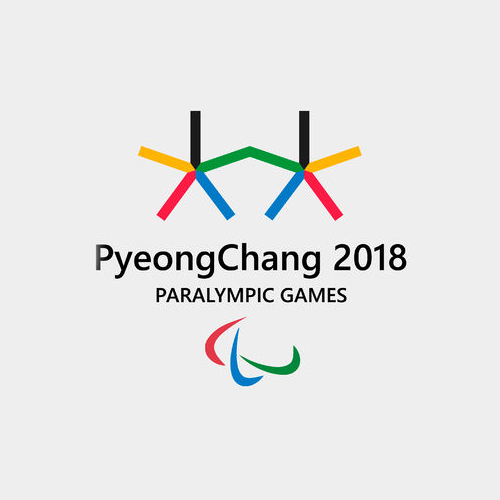Christmas and New Year Opening Hours
We're hiring! Senior Orthopaedic Physiotherapist wanted
Physio Paul Prepares for Another Paralympics
An introduction from Raph Rinaldi
An introduction from Raph Rinaldi
Raph joined Physio Remedies as a specialist spinal physiotherapist in January and we've asked him to introduce himself in the following blog post. Here he talks about knowing how you, as a patient, feel, hints at his ongoing work with the British Bobsleigh team and mentions his favourite sports.
I've been where you are
As a valued patient of Physio Remedies, I thought it would be useful to talk about a few experiences that made me understand how most of you may feel when not in great shape.
I suffered a few recurrent episodes of low back pain a few years ago. It all started with a mild niggle after a walk.
I ignored it at first and kept being active and working. I took a few tablets and kept going, firmly thinking that knowing a bit about low back pain would grant myself exemption from doing the things I was preaching everyday.
In less than a week I was crippled with pain and unable to do simple things without spending a great deal of energy to focus, feeling exhausted at the end of the day. Most worryingly, I felt embarrassed to experience low back pain whilst I was taking care of fellow sufferers. The best move I made then was to seek help from my colleagues at work; having an external eye made me realise what was wrong with me and get a disciplined, simple approach to manage it.
Londoner = high performance sportsperson!
The second point I learned over the years is that being a Londoner is for performers! The total amount of mental, physical and emotional load stemming from commuting, working, lunch breaks, social life, home and family is very similar to the multi-dimension stress affecting athletes travelling and competing around the world.
I had the opportunity to work full time in high performance sports, most recently with the British Bobsleigh Team.
We lived six months per year out of our briefcase, soldiering winter weather, crammed into a car or a van for hours, often straight after racing, trying to sort out food and battling cold bedrooms.
Commuting with the British Bobsleigh team!
In a way, I felt there is not much difference for a Londoner to rush back on a train straight after performing for your best presentation or task at work in an adrenaline-fuelled meeting. For that reason the amount of mental fatigue sometimes prevails, making you focussing on essential, urgent tasks without adopting regeneration or decompression days.
Do simple things that you enjoy
Raph inline skating!
I have been a high-performance race walker and cross country skier in my younger days. The benefits vastly outweigh the costs. It’s very low tech and gives the opportunity to recharge mentally and physically.
Due to chronic paucity of snow in London, I love use inline skates with cross country poles. It’s a fantastic way to exercise your core with very low risk of falling – the poles help you to balance.
The only thing to aware of is the myriads of tourists taking shots as you are passing by in Hyde Park. There are suitable courses of roller-skiing or roller skating in Hyde Park and Richmond Park but I will be always happy to go for a session in either!
Raph is currently supporting the GB Bobsleigh team at the World Cups and World Championships until the 11th of March but if you’d like to make an appointment to see him when he returns, please do call us on 02030 12 12 22.
Words and images by Raph Rinaldi.
Take your running in a different direction: Visually Impaired Guiding
Keen to do take your running in a different direction or to make a difference? Our NoviceRunnerNik has a story for you:
Take your running in a different direction: Visually Impaired Guiding
Run Leading
I’ve been a qualified England Athletics Run Leader (Leader in Running Fitness) for a few years. My running club put me through the course. One of our coaches plans and organises routes but the leaders are there to lead the route, manage the group, risk assess and make route changes if needed (e.g. when you find a tree has just fallen across the road you were supposed to be running up!) and keep everyone safe and happy. I lead a run with the club each week, usually, but not always, from the back of the group, encouraging the slower runners and making sure no one is left behind. Learning to enjoy running and other physical activity in my late 30s has been a complete revelation and life changer and I’m keen to inspire others to get outside and move.
VI Guiding
In February this year I attended an England Athletics Sight Loss Awareness Course & Guide Running Workshop where we learned how to support more visually impaired (VI) people in running. We learned that visual impairment covers a huge spectrum of sight issues, from mild to totally blind, and that you won’t insult a visually impaired person if you say ‘See you next week’. We practised running blindfold with a guide which is frightening when you go from full vision to no vision, even when you’re tethered to a guide. I learned that telling someone to turn 90 degrees to the left doesn’t help much when you can’t see how much you’re turning! We learned that a guiding partnership is very unique and you have to, to a large extent, work it out as you go. And finally we learned that the hardest thing about guiding is finding visually impaired people who want to run!
Finding VI Runners
I set up a Facebook Group to help connect local VI Guides with VI runners and wannabe runners and anyone else interested. We’ve had some success, pairing a guide from the course with a VI runner who was in desperate need of a training partner and guide for the London Marathon. I’ve talked to various signposting and support organisations to try and get us known about.
A VI Runner Finds me!
But no VI Guiding joy for me until August when I had an email via Run Together’s Find a Guide website, where I’m listed as a Licenced VI Guide. Sam emailed to see if I would guide her at the Eden Project parkrun when she was visiting the area on her holidays. I was so pleased to be asked but explained that I had yet to actually guide anyone and I’ve only run that course once. Whilst Sam was fine with this, the Run Director of the parkrun preferred that Sam used one of the course’s VI guides who was very experienced on this fast, popular and narrow course. To avoid possible pile ups Sam went with their suggestion but very kindly offered to meet me in Truro to take me out for my first VI Guiding experience.
And we go for a run!
I met with Sam, her husband Matt and her lovely Guide Dog Lizzie at the start of the route my club uses for its Walk Run group as although it’s not without its hazards, it provides varying but easy surfaces to run on and is partly away from traffic.
Lizzie the Guide Dog was very friendly!
Talking with my hands - not all that helpful!
Sam and I were both a bit nervous – it was quite a lot like a blind date! Sam had previously been a sighted runner before her vision began to fail and she’s been a VI runner for a year or so. She ran the London Marathon this year with her brother guiding her, so is very experienced. We talked about how much she can see, how she likes to be guided, what I need to tell her about and how, which side of the guide she runs on, how to use the tether and so on. We donned our Run Together High Vis bibs with’ Blind Runner’ and ‘Guide Runner’ on them and then we were off. I watched the route surface all the time and to let Sam know of surface changes, variations in surface height (‘high knees Sam’ then ‘back to normal Sam’) and changes in direction (much used by the Chuckle Brothers but ‘to me’ and ‘to you’ or ‘away from me’ worked much better for us both than left or right!) just before they happen.
Running and chatting.
The Reality of VI Guiding
Sam and I confessed that we are terrible chatters – I do love a good chinwag when I run socially as it passes the time and helps with the tedium of long runs – but as a guide you have to remember to keep feeding back the useful information and instructions, so you often have to interrupt the conversation.
As a guide you have to do all the thinking and basic decision making for the both of you. Although I had a simple route lined up, I had to think about where we were going, when we should stop to let a car pass. And guiding is exhausting! Sam said to me that guides need to be fitter than their running partners as so much energy goes into the guiding part of the run and she wasn’t wrong. We ran 2.75 miles at a slower pace than I’d run on my own and I felt like I’d raced a 10k! I’m in awe of VI Runners and their guides running marathons and offroad trails. Just incredible.
I really enjoyed running with Sam – she was so friendly and helpful and gave me a great first guiding experience, which I’ll always be grateful for.
Running and smiling!
Obligatory post-run selfie!
Get Volunteering!
Sam told me that in her home county of Essex there’s only one guide, so he’s in huge demand. I suggested she moves to Cornwall where she could have a different guide every day of the week!
If you’re looking to take your running, or other activity, in a different direction consider volunteering to help others do the things you like to do. From parkrun to run leading to VI guiding, there are all sorts of opportunities out there.
Words by Nicola Bathe, images by Colin Bathe.
Paul Martin's Winter Paralympics Roundup
Paul Martin's Winter Paralympics Roundup
Physio Remedies' Physiotherapist and Director Paul Martin is also Technical Lead Physio for Paralympic Sport with English Institute of Sport and he's just back from the Winter Paralympics in PyeongChang.
Paul's written up his Roundup of The 2018 Winter Paralympics for your reading pleasure:
Brrrrh, snow!
Every Games is different in one way or another. Although there are some standard consistencies across the board (the general cosmopolitan feel of so many people from so many nations in one place, the obsession about the food hall, athlete performances and their repercussions both good and bad) each Games has a number of unique touches that mean attendees will have very specific memories that in a moment can return them to a very specific place and time.
There were many of these with PyeongChang but I think one of the most obvious this time, which may sound a little silly given the 'Winter' part of the Winter Games, was the snow. PyeongChang is the coldest place in the world on its line of latitude (it is south of The Azores, Madrid and Athens to name but three places), is at a very modest altitude of 700m and has an average snowfall of 15cm per year. An interesting idea to hold a Winter Games here, although as many people that attended the Games in Sochi would tell you, it doesn't need to be wintry to host a Winter Games. The 2022 edition will be in held that traditional alpine resort Beijing, after all!
On arrival, the local area had received 50cm of snow overnight rending the vast majority of the village treacherous to move through. The local solution was to bring in a lot of diggers and trucks to scoop the snow away. A fine idea until one considers how these vehicles might get into the required area in the first place! The temperatures were unusually cold for the area as well, initially ranging between -15 and -6 but wind chill taking it a lot lower than that. These conditions made for some spectacular views and wonderful pictures, but athletes in wheelchairs trying to push themselves around a snow-covered village had somewhat larger problems to deal with.
The cycle of temperatures that eventually crept above freezing meant that areas of the Village became skid-pans and it took a while to get enough salt out to manage the problem. Once the majority of it had been cleared however, 30 cm fell over another couple of days. Fortunately much of this had been sorted by the time the Opening Ceremony started and while there was still a lot of snow around, most areas were easily navigable with care. Within six days of the Games starting, we had temperatures of 15 degrees - t-shirt and shorts weather - and quite the temperature swing. Then it snowed again....
Compact
The entire feel of the Winter Games was a lot more compact than a summer event. Smaller Village, smaller team and fewer medal events, however the drive from the athletes and the support offered by the British Paralympic Association remained as high as ever. The role of the BPA in this context is to create an environment where the athletes and coaches can focus solely on performance. The attention to detail required to deliver this is phenomenal and the entire organisation goes into overdrive, whether that is delivery within the Village to the team, engaging with commercial sponsors and dignitaries, organising media opportunities (quite a challenge given the small number of media there and the nine hour time difference to the UK), providing exposure of the environment to the next group of potential Paralympians (the Paralympic Inspiration Programme, or PIP, that allows some access to selected athletes so they can understand what they can expect at Games time which was managed with assistance from the Help For Heroes charity) to the day-to-day planning of logistics around athlete/coach/practitioner movement between different venues, planning of the bump-out (which started around Day 3 of 9 when it felt like we'd only just got in!) and doing as much as possible so that the everyday stresses were removed as much as possible from the people that mattered. The 'behind the scenes' work is vast and hard, however there is much more of a blue print for the type and style of what is required and it now becomes a challenge of how to fit what we need into the spaces we are provided with by the local organising committee.
Medals!
Competition was, as always, exciting and, fortunately, successful. UK Sport had set Paralympics GB a medal target of between 6-12 with an overall target of 7 medals. No previous GB Winter Paralympic team had achieved this and it was a reflection of the investment they had made into the Winter sports. Things got off to a shaky start when the opening run of one of our top medal prospects in the downhill event (Menna Fitzpatrick and her guide Jen Kehoe) ended in less than 30 seconds when Menna fell. Step up Millie Knight and her guide Brett Wild who posted a phenomenal time to lead the field. A crash in PyeongChang the previous year at the test event had resulted in some confidence problems (detailed in this piece), however in training it was becoming clear that the pre-crash Millie was starting to return. Her time was bested by Henrieta Farkasova from Slovakia who had dominated the Visually Impaired event throughout the season and would go on to win gold in 4 of the 5 events. Her sole silver was on the very last day when she was beaten to Slalom Gold by Menna and Jen.
As for the rest of the 17-strong squad, the Curlers had an event they might like to forget, however good early wins against Paralympic Champions Canada and World Champions Norway showed there is still enough talent to trouble the best in the world. The gold was won by China who look like they could dominate this event for some time to come. Although the final was a tight affair, it seems that they are taking this event seriously ahead of a home Games in 4 years.
Elsewhere on the slopes, the snowboarders found conditions not especially to their liking and although some strong top 10 finishes were welcome, a couple may have been a little disappointed not to podium after some of the successes they have had on the World Cup circuit. The standing alpine skiers pretty much hit par for what they were expected to achieve and left happy with their finishes. In the Nordic events, the most punishing in the Winter programme, and possibly across the entire Paralympic landscape, Scott Meenagh performed very creditably, especially that he has only been involved for 18 months. He is relishing the challenge the sport offers him and is constantly looking at means of progressing his performance. Six hard endurance events in nine days in very changeable conditions propelling yourself with arms only is a gruelling programme but in every event he left everything on the course. Watch this space.
So it was left to the Visually Impaired ladies to scoop all of the medals required. 2 silvers and a bronze for Millie and Brett, a gold, 2 silvers and a bronze for Menna and Jen. Our only previous gold medallist Kelly Gallagher competed, however her performances were hampered following a couple of falls and injuries, however Kelly is not one for giving anything less than 100% and she knows she did everything she could have done to give her best performance. Menna and Jen's win in the Women's slalom coupled with Millie and Brett's bronze meant that the target of 7 was reached in the very last alpine event - plenty of relief all round!
Paul took some great photos - you can see them all here!
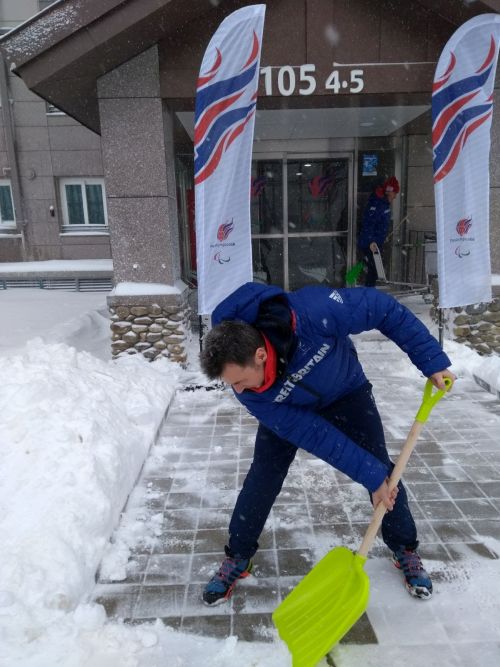
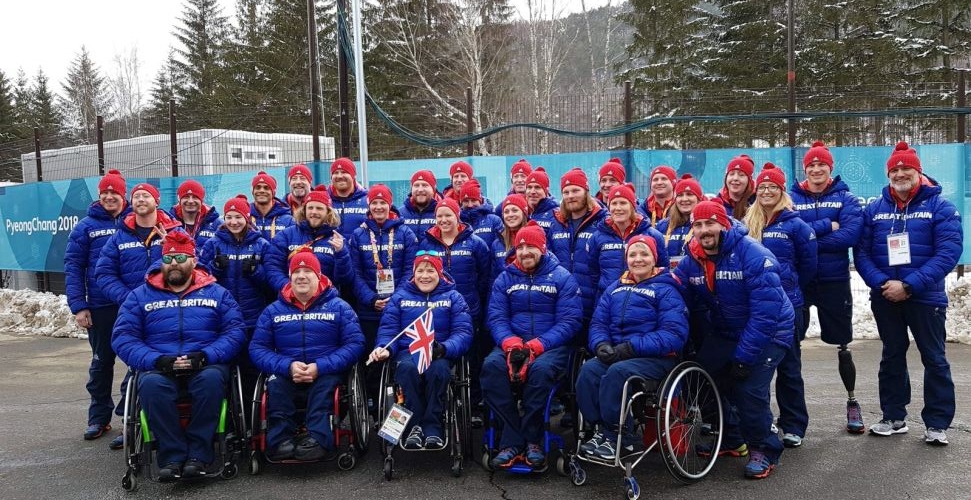
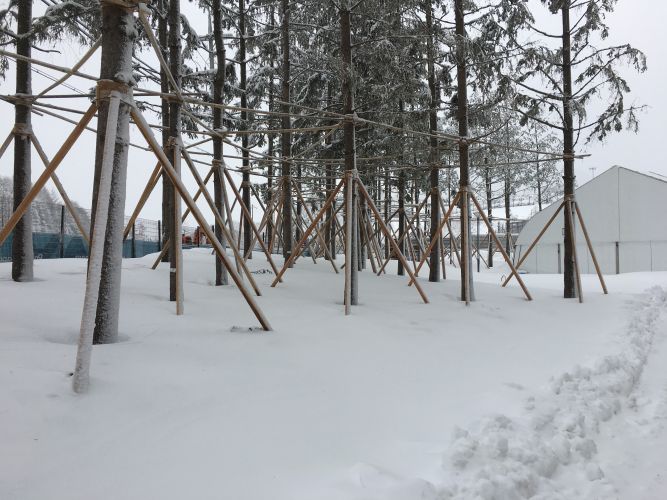
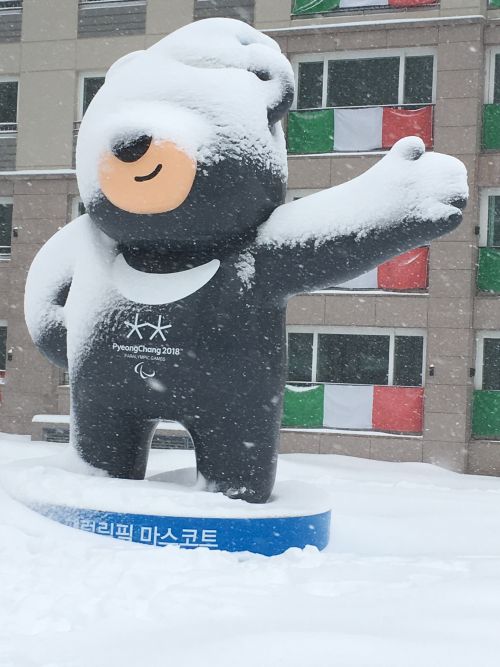
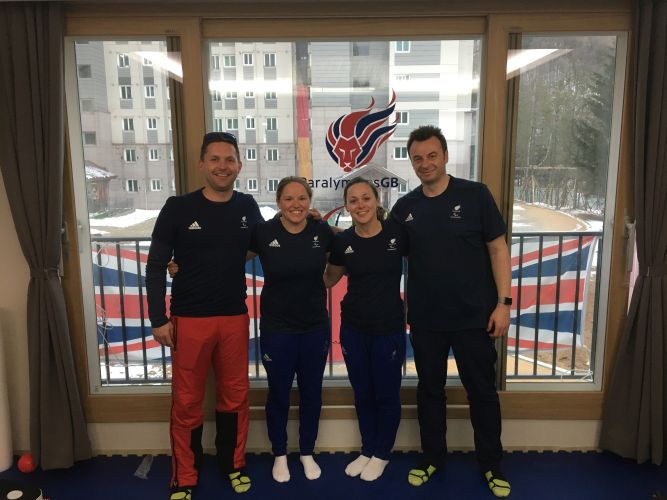
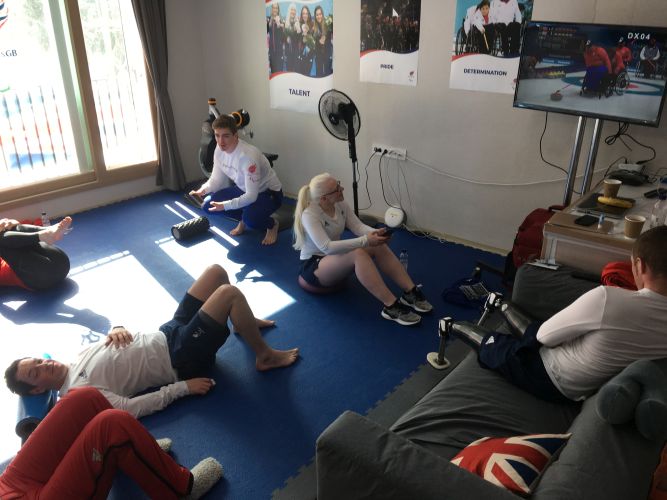
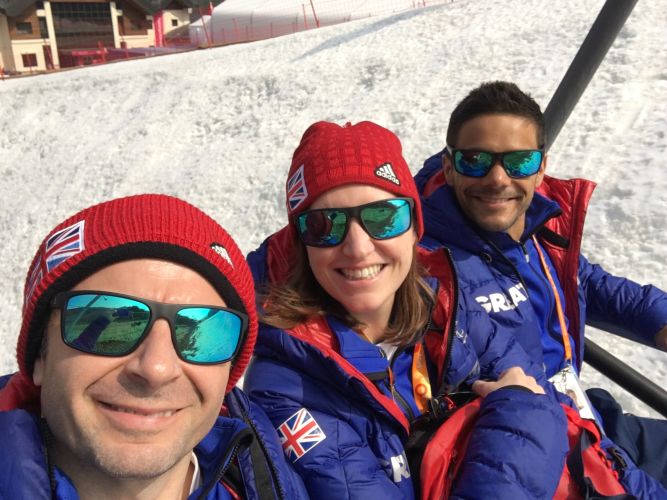
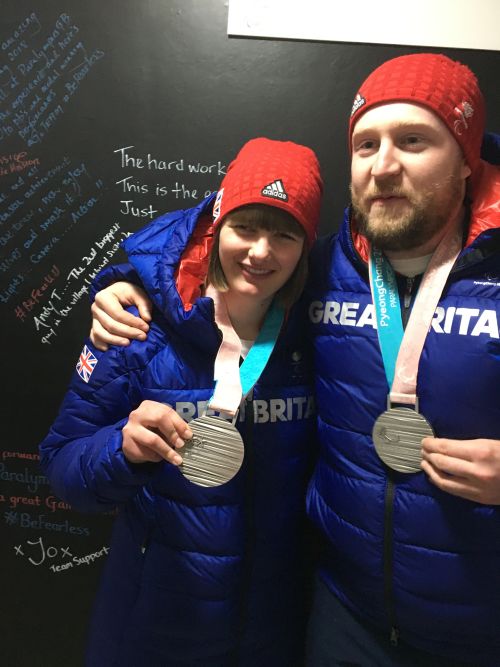
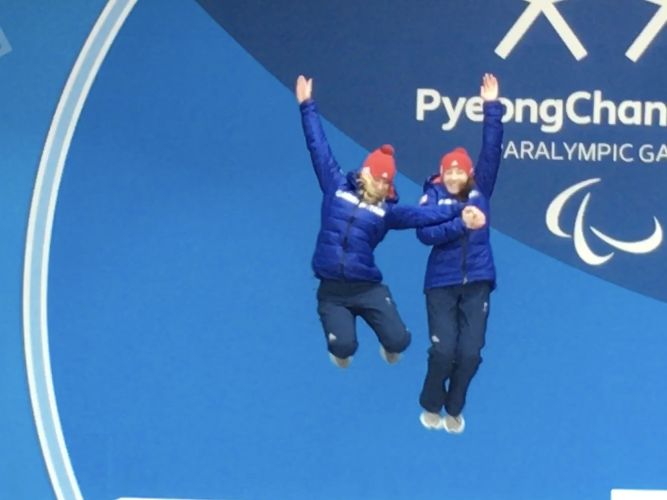
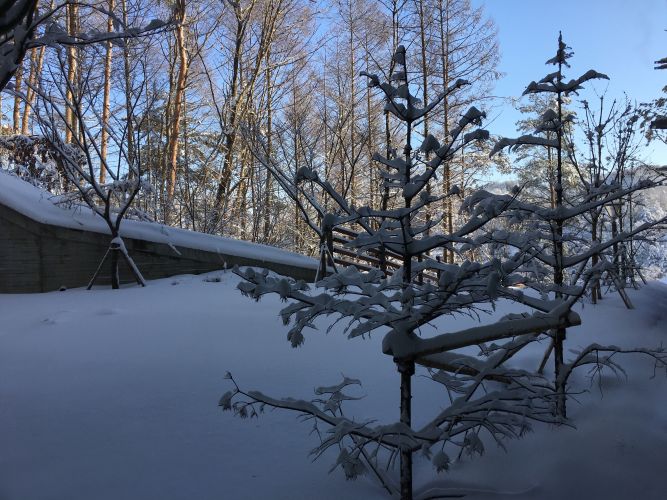
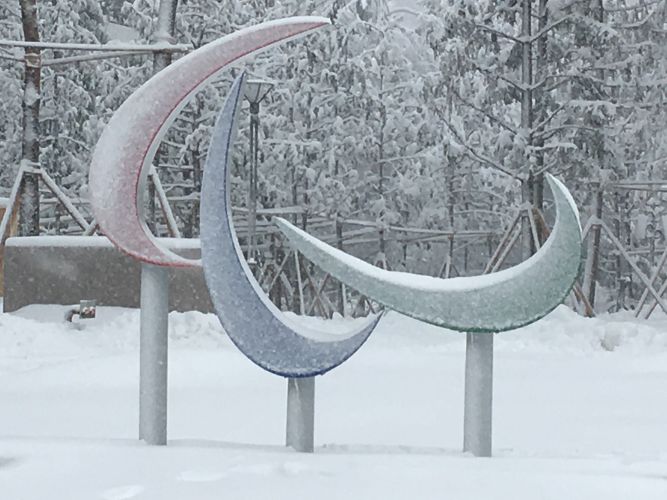
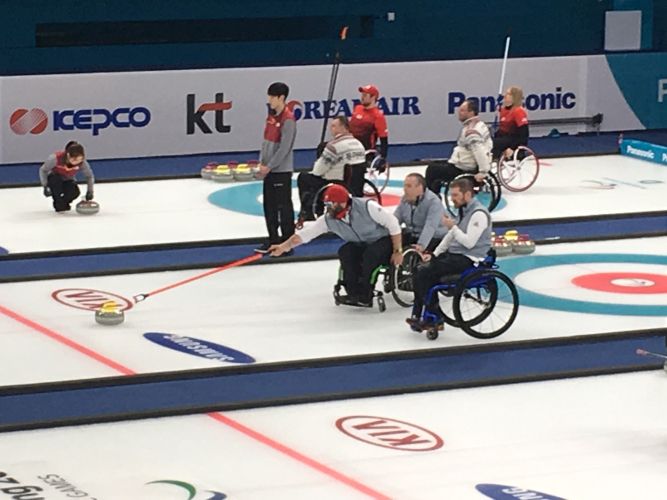
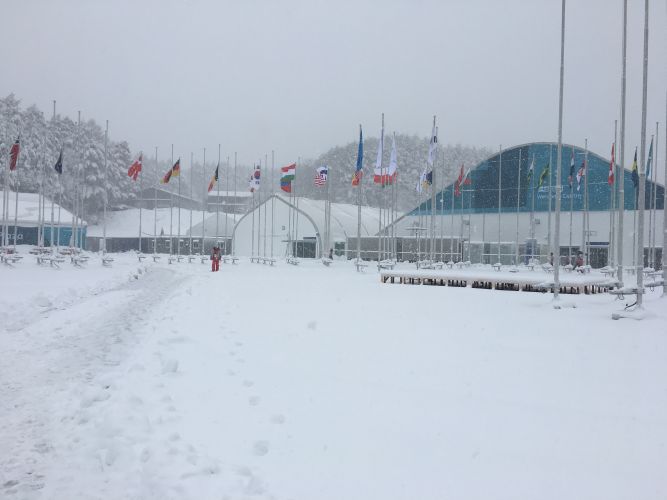
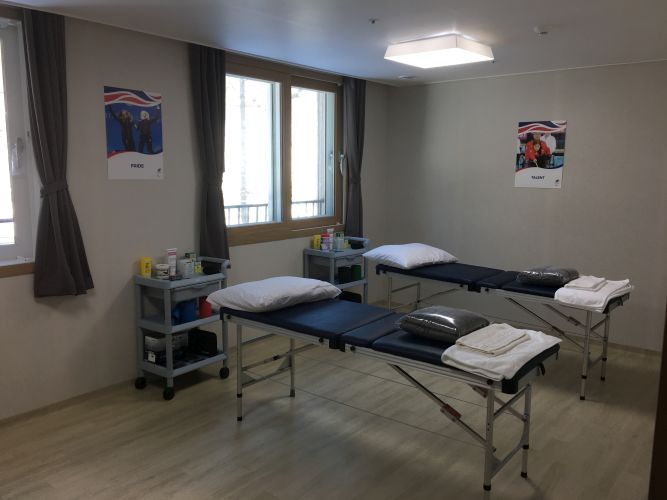
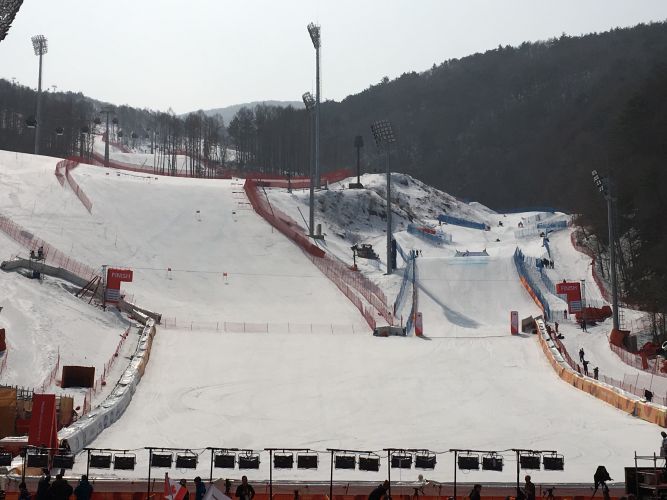
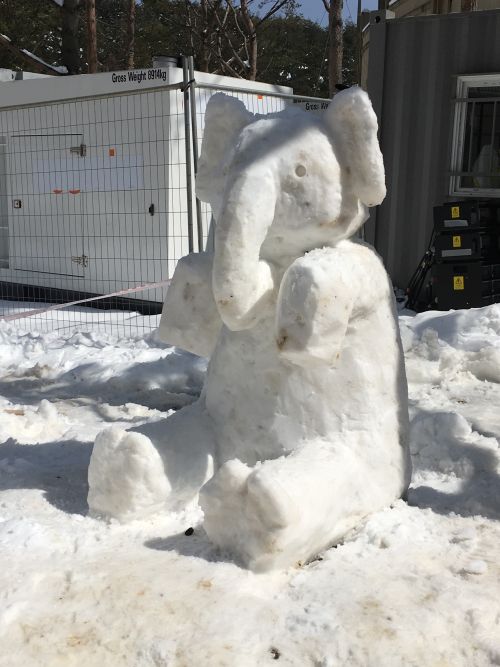
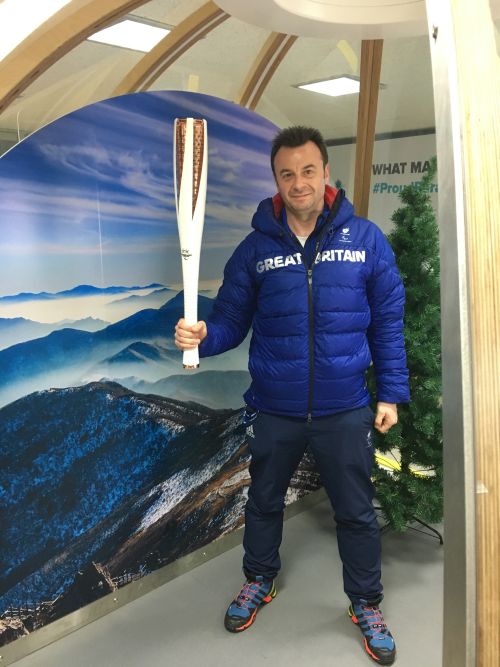
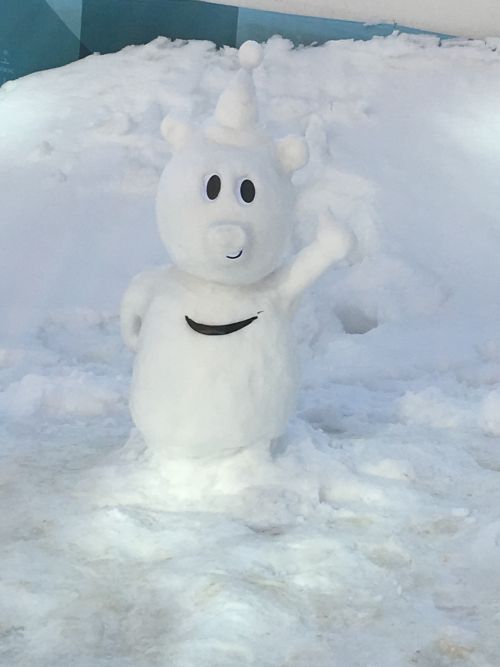
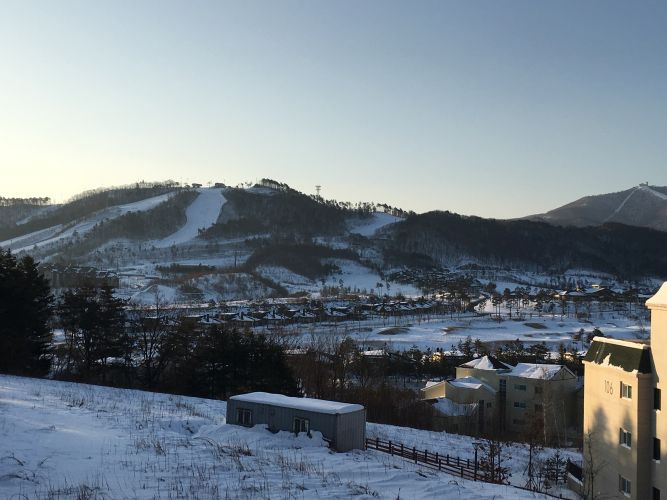
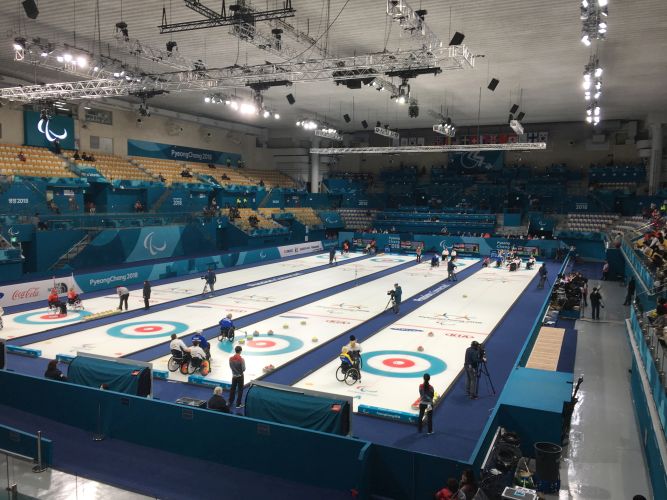
Words and images by Paul Martin.
Paul Martin's Low Down on the Winter Paralympics
Paul Martin's Low Down on the Winter Paralympics
In his other life Physio Remedies' Physiotherapist and Director Paul Martin is Technical Lead Physio for Paralympic Sport with English Institute of Sport. Once again he's been working with ParalympicsGB athletes to get them ready for the Winter Paralympics and will shortly be heading to PyeongChang to support the team during the Games.
We asked Paul to give us the lowdown and his 'ones to watch' of the Winter Paralympics:
Preparations:
As the Winter Olympics draws to an end, preparations start for the Winter Paralympics in PyeongChang to start with the opening ceremony on 9th March. As part of the handover process, some of the Paralympics GB delegation will be in the Village for the final 2 days of the Olympics to start planning how we will use the space and to ensure our space is prepared for the arrival of the athletes, some of whom will enter the Village on the first day of opening on 3rd March.
New Kit:
Now it's a case of packing the essentials and making sure the final preparations for the team are set. The official kit arrived in early January (which gave ample time to get rid of some of the Christmas bulk that made it look just a little too tight!) and as might be expected for a winter games, it is a lot bulkier and warmer than the summer games kit. It is essentially what you have seen the Team GB athletes wearing with the Paralympics 'face on' lion rather than the Team GB lion in profile. This means there is much less space for packing and given the Opening and Closing Ceremonies wear (provided by Asos, it is very warm and very bulky!), extra kit space will be at a premium.
Competition Events:
There are 6 competition events in the Winter Paralympics with a total of 80 medals at stake; Alpine Skiing, Biathlon, Cross Country Skiing, Para-Ice Hockey (formerly known as Sledge Hockey), Snowboarding and Wheelchair Curling. Paralympics GB has athletes competing in Alpine Skiing, Biathlon, Cross Country, Snowboarding and Wheelchair Curling and the medal target from UK Sport is 7 medals (in a range of 6-12). This is quite a challenging total and within the first 3-4 days there should be a good idea of whether we will hit our target as many of our best events are early in the Games.
Ones to Watch:
Many of these will come in the Alpine Skiing where GB athletes have perfromed well so far this year and are improving. Kelly Gallagher will be defending her Super G (visual impairment) gold medal from Sochi with guide Gary Smith. They will be pushed across all their events by Millie Knight (with guide Brett Wild) who competed in Sochi as a 15 year old and Menna Fitzpatrick (with guide Jen Kehoe) who have won 10 medals in 10 World Cup events this season. James Whitely and Chris Lloyd will be competing in the standing classification in the Men's events.
For the first time in 20 years we have an athlete competing in Biathlon and Cross Country. THis is a new sport for Scott Meenagh who transferred from rowing and in 14 months is starting to make his mark iin both disciplines. The former Royal Engineer has been improving through the season and any top 10 finish would represent an excellent Games for him in his 8 events.
Snowboarding makes it's debut in Pyeongchang with events in Banked Slalom and Snowboard Cross. Owen Pick, Ben Moore and James Barnes-Miller will be flying the flag and with a couple of podium finishes for them already this year, and in a sport that can be unpredicatable at the best of times, anything is possible!
Finally, the GB Curlers won Bronze in Sochi and Aileen Nelson and her experienced team will be looking to better that. They have beaten everyone on the circuit at one point or another this season so hopes are good.
Enjoy the show!
Words by Paul Martin.
Fraser Cartmell: How Does Racing as a Professional Athlete Work?
Somebody racing as a full time professional triathlete is quite clearly not common amongst the general population, and so from time to time I am asked by those who are curious enough, to explain "how does that work?" when I mention what it is that I do with my time.
Ultimately there are a number of different pathways towards professional triathlon racing - nothing is set in stone, which makes for exciting opportunities at different points in life for people, depending on their own circumstances and lifestyle choices.
The Traditional Route
For me, I suppose it was a more traditional route - at least here in the UK anyway - which began as a junior athlete who was finishing school and embarking on my university studies. Representation for GBR at championships events across the world came my way through the National Federation 'system', which in turn supported me to simultaneously combine my University degree with many hours of swim, bike and run training. Ultimately I wasn't good enough at this format of 'draft - legal' or Olympic distance ITU racing to reach major events as a senior athlete and the Federation support (financial / medical / logistical) fell away.
The Non-Drafting Route
However, I still loved the sport and was keen to explore the concept of 'non drafting' or Ironman racing. This would mean braving the world of racing without the outside the 'support bubble' I had been fortunate to receive, but equally it would give me the freedom to choose whatever type of race I might want to do, rather than what I "had" to do as previously determined by the Federation and their qualifying criteria.
National Lottery Funding
These are two different pathways to racing, but both allow triathletes to race professionally and earn a living. In the UK athletes are very fortunate to access the much lauded National Lottery Funding and the associated support structures. However you have to be exceptionally good to reach this level, and of course to stay there year on year is no easy task either. When this funding disappears athletes can understandably struggle with how to move on and can at times be lost to sport at an elite/professional level because they simply can't continue to make ends meet.
Sponsorship
Nonetheless, racing the 'non drafting' Ironman circuit of events - as I have done for many years now - can provide all sorts of new opportunities to work with a host of different potential sponsors. These could either be brands from within the industry providing equipment sponsorship, or indeed non-endemic companies you have some association with (perhaps locally) who in turn can hopefully provide the financial support that was lost from the aforementioned Federation.
Essentially the long term goals of reaching the pinnacle of your event will remain. Previously that may have been the World ITU championships or even the Olympic Games, and now it has become Ironman Hawaii, for example. The only real difference is who you are representing when you get there. It will either be a national federation or likewise a group of personal sponsors who share your goals and agree to support your journey in whatever way they can.
If you're interested in sponsoring Fraser, just pop an email to us at info@physioremedies.com and we'll put you in touch with him.
Physio Remedies: Our Specialisms
Physio Remedies is a Centre of Excellence for Physiotherapy, providing a Consultant-level service with direct links to surgeons and consultants.
Just like surgeons and consultants, our physiotherapists are specialists in their own areas and they work to mirror, consolidate and support the work carried out by orthopaedic surgeons to help you get back on your feet as quickly as possible.




















